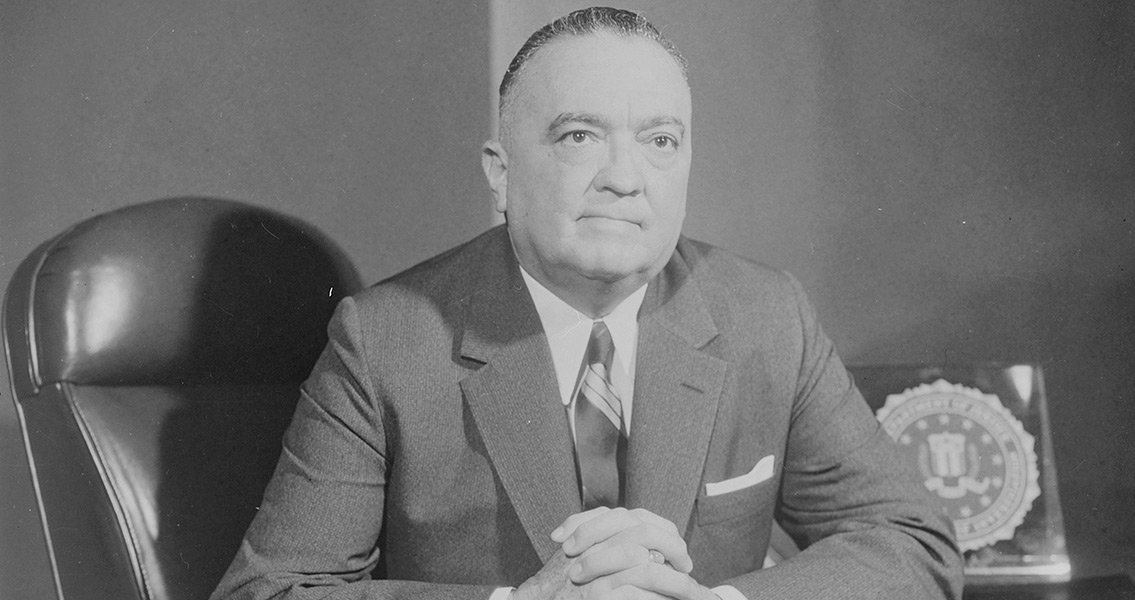<![CDATA[On 2nd April, 1972, FBI Director J. Edgar Hoover died. Running the organisation for nearly five decades, Hoover played a key role in the creation of the modern FBI and the development of modern crime fighting techniques. He also became a controversial figure, associated with the FBI's abuse of power. John Edgar Hoover was born on 1st January, 1895, in Washington D.C. Educated as both a librarian and lawyer, he started working for the Department of Justice in 1917. During the 'Red Scare', a US wide fear that communism could infiltrate the country, Hoover worked as a special assistant to the Attorney General, Mitchell Palmer. By 1921, Hoover had overseen the creation of an index card system with over 450,000 files supposedly listing the names of every radical leader, organisation and publication in the United States. More than 10,000 alleged communists were arrested during the Red Scare, creating a backlash against the investigations overseen by Palmer. Nevertheless, Hoover's reputation emerged untarnished, and in 1924 he was appointed director of the Bureau of Investigations (what would become the FBI), a branch of the Justice Department founded in 1909. With Congressional approval, Hoover revolutionised the FBI during the 1920s, establishing a central fingerprint file, a training school for agents, and a crime laboratory. More importantly, he removed the corruption for which the agency had become known, establishing an image of an efficient, incorruptible crime fighting agency. This image was cemented with the Bureau's campaign against the organised crime surrounding Prohibition in the 1930s, with notorious gangsters such as Louis 'Lepke' Buchalter and John Dillinger being killed or imprisoned by the FBI. Tellingly, a 1936 poll of American school boys saw Hoover voted the second most popular man in the country, behind only Robert Ripley, the creator of Ripley’s Believe It Or Not. It was during the Cold War period that the FBI and its methods came into question. Fear of radicalism, and particularly communism, returned to the United States. The FBI compiled millions of files on Americans suspected of dissident activities, and Hoover worked with Senator Joseph McCarthy, the man who drove the communist witch hunt in American politics. In 1956, Hoover instigated the creation of a new counter intelligence program called Cointellpro. The top secret initiative was originally intended to target communist organisations but it soon expanded its remit to include any dangerous groups, including the Civil Rights Movement. Civil Rights leaders, including Martin Luther King, became the subject of harassment and surveillance by the FBI, and questions started to be asked about the amount of power the FBI could wield. By 1969 Hoover had started to receive public criticism for his leadership of the FBI. Congress passed laws limiting the tenure of FBI directors to ten years, and requiring Senate approval for the appointment of any new director. Hoover’s death came shortly before the Watergate Affair started to unravel in the media, with the resulting hearings concluding that the FBI had illegally used its authority to protect President Richard Nixon. Since his death, and the Watergate revelations, Hoover’s reputation has diminished as new information has been revealed about FBI breaches of civil liberties. Hoover, once considered the embodiment of honesty and integrity, has been repainted as corrupt, dangerous and discriminatory. Largely this reevaluation is down to hindsight, and the reassessing of key events in the post-war period that Hoover was involved with. Undoubtedly a controversial figure, it is also important to remember that Hoover played a crucial role in the development of modern crime fighting techniques, laying the blueprint for the modern FBI. ]]>
The Death of J. Edgar Hoover
